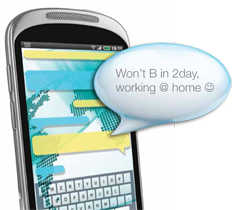Millennials: Are they really that different?
by Mary Jawgiel
 This is a story about a hypothetical Millennial employee and a Boomer supervisor. Ashley, a Millennial sales representative for ABC Distributors Inc., has a major report due on Monday. It’s Thursday afternoon and her boss, Linda, a Boomer, is pretty sure Ashley hasn’t even started writing it yet.
This is a story about a hypothetical Millennial employee and a Boomer supervisor. Ashley, a Millennial sales representative for ABC Distributors Inc., has a major report due on Monday. It’s Thursday afternoon and her boss, Linda, a Boomer, is pretty sure Ashley hasn’t even started writing it yet.
Ashley, along with her boss, will be in a meeting for the rest of this Thursday afternoon. During the meeting, Ashley appears to be disengaged, spending time on her mobile device looking up information for the report that’s due on Monday. Linda’s boss was in the meeting too and wasn’t happy with Ashley’s actions, and he made sure Linda was aware of his feelings. The meeting ended late and, before leaving for the day, Linda briefly mentioned to Ashley her displeasure with Ashley’s behavior during the meeting.
When Linda came in on Friday morning, she received an email from Ashley advising her that Ashley was not going to be in. Ashley had something she needed to do
at home, but would spend time working on the report in order to have it to Linda on Monday morning. Ashley noted if anything else was needed Linda could text her and she would respond.
Linda was extremely upset that Ashley just left an email and did not talk with her. Linda was also put off by Ashley telling her she would work at home without getting prior approval. Linda thought, “What is it with these younger workers, not wanting to come in to the office to get the job done?” After taking some time to think through her response, Linda decided to wait until Monday to have a face-to-face meeting with Ashley.
When Linda got in on Monday morning, Ashley’s report was already on her desk. She decided to read it before setting up her meeting with Ashley to once again go over policies and procedures — only this time Ashley would receive a written warning for not following the rules.
Linda reviewed the report and Ashley’s work was excellent. She was faced with a dilemma now — put a high producer on probation or let Ashley get away with breaking the rules. Sound familiar?
Each generation develops its own ways of communicating, acting and
thinking. These behaviors develop based on experiences shared by that age group, from political happenings to technological breakthroughs to natural disasters. These are the kinds of things that shape us as we grow up and mold our way of dealing with our world. And, every generation is different.
Millennials are rapidly becoming the largest generation in the workplace. There has been a lot of research and writings showing how different they are when it comes to communication, dress code, having fun at work, respect, work ethic and just about every aspect of working life. They are different but are they really that different?
It’s been said Millennials don’t take work as seriously as past generations and are more interested in their social lives than in doing a good job. Let’s take a look at each of these behaviors from both Ashley’s and Linda’s point-of-view.
Many Millennials love the idea of being flexible, whether that means not coming in to the office or working hours that are not 9 to 5. Generally, Boomers believe that the office is where work is done — it has all the information, the tools and the people necessary to get the job done.
Millennials have grown up with technology that allows them to access information from anywhere at any time on any day. So, for Ashley, it’s a natural extension to look at the working environment in a similar way. Why be tethered to a desk in the office on Friday (the day her BFF is in town and they are meeting for lunch, and, hey, relationships are important too!), when she can access the office computer through the cloud on Saturday. She can have that report on Linda’s desk first thing Monday morning without staying late Friday or even coming in at all.
Ashley, like many Millennials, loves to multi-task. She can listen to music while on a treadmill, or watch a movie on her iPad and text a response to her friend on her iPhone while she looks up a place to go to dinner on the same device. So, how can anyone think she isn’t paying attention to what’s happening in a meeting when she is on her mobile device during a meeting?
Linda’s Boomer background doesn’t allow her to accept that people can concentrate on more than one thing at a time. Those in the executive office, like Linda, want everyone’s attention focused on them when they are speaking. But even Linda has to admit that she herself is guilty of multi-tasking (like reading email while on a conference call) but she will do it discreetly.
Millennials, like the people from other generations, do care about doing a good job and are willing to put in extra time if needed to get the job done right. Ashley spent time on Friday (after her lunch date) and about 10 hours over the weekend working on the report. Working hard and producing a good product is just as important to Millennial workers as to earlier generations. Millennials just want to do it on their terms. If we want to keep our younger employees, we need to try and understand the reasons behind their actions and see where we can adapt workplace policies to ensure we don’t lose our rising stars.
 Mary Jawgiel is ICP program director for the PTDA Foundation and is managing the new ICP Job Board at www.industrialcareerspathway.org. Mary’s life-long passion has been working with young people. Industrial Careers Pathway (ICP) is a cross-industry initiative supported by the ISA Foundation, NAHAD: The Association for Hose and Accessories Distribution and the PTDA Foundation. For more insights on recruiting, hiring and training Millennials in the distribution industry, subscribe to the ICP Talent Tipsheet at www.industrialcareerspathway.org/Subscribe.
Mary Jawgiel is ICP program director for the PTDA Foundation and is managing the new ICP Job Board at www.industrialcareerspathway.org. Mary’s life-long passion has been working with young people. Industrial Careers Pathway (ICP) is a cross-industry initiative supported by the ISA Foundation, NAHAD: The Association for Hose and Accessories Distribution and the PTDA Foundation. For more insights on recruiting, hiring and training Millennials in the distribution industry, subscribe to the ICP Talent Tipsheet at www.industrialcareerspathway.org/Subscribe.
This article originally appeared in the Nov./Dec. 2013 issue of Industrial Supply magazine. Copyright 2013, Direct Business Media.













